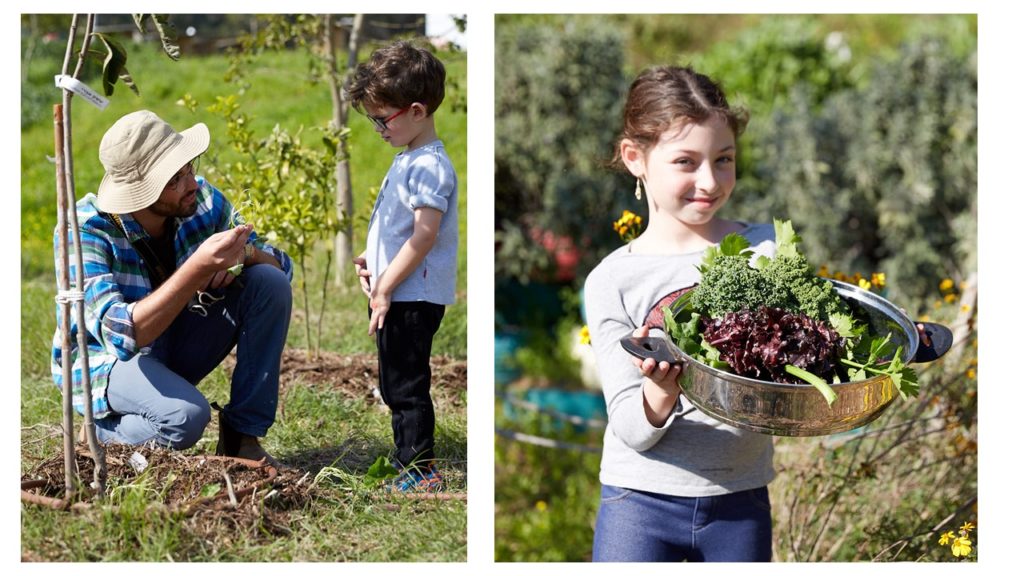“I will command my blessing on you in the sixth year” – The sixth year before the shmita is the time to develop social resilience
In the “Behar” Torah portion, God commands the people of Israel to observe the shmita – by stopping the cycle of agricultural activity (which most people rely on for sustenance) once every seven years and make due with things that grow on their own. The following verses address a question that may arise: “But you might ask, ‘What will we eat during the seventh year, since we are not allowed to plant or harvest crops that year?’” (Leviticus 25:20) – In other words, it’s fine and dandy to take a break from work and all, but if we don’t plant what will we eat? The same verses that command us to halt the economic wheel once every seven years, also express the fear that this utopia harbors the seeds of a looming catastrophe.
Today, we are far from the reality described in the Torah (since most of society does not make a living from agriculture), but at the same time we’re all-too-familiar with the concerns expressed here. To our astonishment, for more than half a year now, the Israeli economy has been semi-paralyzed.
“I will command my blessing on you in the sixth year”,
In response to this human apprehension, the text offers a divine blessing (Leviticus 25:21): “I will command my blessing on you in the sixth year so the land will produce a crop large enough for three years.” You have nothing to fear, God Himself will provide you with an abundance that will allow you to observe the shmita properly. In contrast, Moses Sofer offers a different interpretation, saying that the Land of Israel always yields plenty of grain for its people, and the fear of scarcity is in the first place only due to human behavior – the tendency of humans to disregard the produce and yields in times of abundance and not worry about shortages. According to him, the secret to properly dealing with a sabbatical year is found in our conduct in the six years of activity. Thus, the first verses of the Torah portion can be read as an instruction manual: “For six years you shall sow your field, and for six years you shall prune your vineyard and gather in its fruits.” We must appreciate the agricultural produce and handle it thriftily and honestly, and then we can happily observe the commandment – “But in the seventh year the land is to have a year of sabbath rest ” – and eat from the fruit of our previous labor during that year.
These concepts, which stress the importance of having a value-based society in order to withstand a year of economic slowdown, could explain the first mentioning of the shmita in the Mishpatim portion (Exodus 23:11), within a sequence of ethical commandments, such as the prohibition of bribery, caring for the poor, etc. All this suggests that it is impossible (or difficult) to expect a nation to enter a year of full economic shutdown without being a productive, modest society (and not wasteful or hedonistic) that wisely manages its natural resources and upholds communal and legal mechanisms that foster solidarity. In an individualistic, wasteful society that lacks solidarity, the year of the shmita, with the hard challenges and strong sense of uncertainty it entails (what shall we eat?), may bring about a deterioration and turn into a year of crisis and systematic collapse.

The Covid-19 crisis has caused a “shmita-like” reality, which vividly illustrates the aforesaid. We started this year with no real scarcity in Israel, but that changed quickly as many of us are already in real economic distress, or see it creeping in our direction. The communal and social mechanisms that were supposed to serve as a crutch in such a situation are only partially emerging now, as division and blame are taking the forefront instead of constructive mutual-support.
From “And you will be a blessing” to “And this is the blessing.”
This verse promises a blessing in the sixth year, so that we can withstand the year of the shmita. According to Hasidic teachings, the word “bracha” (blessing) means “hamshacha” (drawing down). According to this concept, in the spiritual worlds, everything exists: happiness, wealth, health and so on – but in order for us to enjoy them here in our world, we must draw them down from above. This interpretation is consistent with the agricultural action of “havracha” which may be the source of the word. Havracha is the action of turning twigs into independent vines, by selecting a vine that has already taken deep roots and inserting one of its long twigs (without detaching it from the vine) into the ground so that only the tip protrudes above the ground, until it too takes root and becomes a fully independent vine. In other words, the essence of the act of bracha (blessing), like the act of havracha, is to draw living beings into the world and into our actions.
Abraham, the father of the nation, was graced with the words “And you will be a blessing” immediately after he was sent on his life’s mission (Genesis 12: 1-2). In his commentary of the verse, Rashi, the great biblical commentator, quoted a bold midrash which claims that with these words God transferred the power of blessing to a mortal being:
“And you will be a blessing – the blessings are in your hands. Until now they were in my hands; I have blessed Adam and Noah and you. From now on you will bless whatever you desire.”
The perception of the act of blessing as that of drawing down abundance and fulfilling it in reality (as the Kabbalists have taught us), explains Rashi’s remarks on the transfer of the “power of blessing” to Abraham. Abraham’s own conduct brought about the realization of a value system that brings blessing, which he imparted to his children, as the verse says: “For I have chosen him, so that he will direct his children and his household after him to keep the way of the LORD by doing what is right and just.” (Genesis 18:19)
The V’Zot HaBracha portion (And this is the blessing) which seals the Torah, starts with the words: “This is the blessing that Moses the man of God pronounced on the Israelites before his death.” Midrash Tanhuma interprets this portion by citing the verse “Many women do noble things, but you surpass them all” (Proverbs 2: 6) and claims that this blessing of the people of Israel on the eve of their entry into the promised land includes all the blessings we had received, ever since Abraham’s blessing and up until that moment, as part of God’s act of entrusting the people of Israel with the power to “establish a blessing”:
“I pass down the blessings to Abraham and his descendants, and whoever establishes a blessing, I shall sanction them, as the verse says: “And you will be a blessing.”
Upon the entry into the Land of Israel, in the last portion of the Torah, it is first implied that this is actually not the end, but rather only the beginning – the beginning of the realization of the blessings promised to the people, which will be fulfilled in the Land of Israel, where we will live securely. The implicit message is that so far we have received external blessings from God and later from our forefathers and spiritual leaders. But now, upon entering the promised land, the ability and power to bless and be blessed is in our hands and depends on how committed we are to establishing a blessed society – one that, through its conduct, fulfils the blessing of God in reality.
Establishing a Blessing – It’s in Our Hands
The phrase “Establishing a Blessing” is reminiscent of the Israeli phrase “establishing facts on the ground,” which refers to the promotion of various moves, out of a need and desire to act immediately within reality. Indeed, within this very complex reality, courageous people, communities and authorities take action and manage to “establish a blessing” – by building structures of community resilience and islands of prosperity.
Some of these initiatives seem to be fulfilling the blessing of the sixth year in practice (establishing blessings on the ground) – while combining the creation of material abundance (e.g. growing food) with the promotion of community resilience (community building, fostering solidarity, and so on).

One example of such initiatives is the trend of establishing outdoor “community centers.” These are outdoor areas (the courtyard of an educational institution, a national heritage site or an urban forest) that serve as a venue for various activities that strengthen community resilience, environmental responsibility and social economy. Thus, when there is no lockdown, you can find in these centers people engaged in yoga and sports classes, seniors studying therapeutic gardening, children working in an improvised “forest gardening” model, families holding a community Shabbat service, and even young people mingling in the new community pub. The ban on indoor gatherings creates a real need for community, and outdoor activities make it possible to achieve this on a small scale thanks to the benevolence of nature (and of the Land of Israel).
Another example is the significant development of agricultural volunteering and the efforts to expand urban agriculture and save agricultural produce in the fields. Many young people have been joining the various initiatives in this area, and thereby reconnecting to the soil of our country, getting an up-close view of its capacity to provide a blessing and adopting a productive value-based lifestyle. Others devote their time to ensure that every person enjoys this abundant fruit of the earth, by creating ways to purchase “farmer-to-consumer” goods, thus offering people a direct connection with the food they eat, and lowering the cost of fruits and vegetables. One initiative I discovered last month, which seems to follow this trend of awarding blessings, is an initiative in which people announce when the fruit tree in their yard has ripened, and allow the nearby community to come and pick.
These initiatives, which are constantly increasing within the ongoing “Corona reality,” stem from a notion of blessing – the drawing down of abundance that already exists, into the reality that seeks it, with an optimistic outlook and a sincere desire to do good.

In Lieu of a Summary
A well-known interpretation of the “Sefat Emet” (Language of Truth) explains that the call heard by Abraham is directed at all human beings all the time, but they choose not to listen, while Abraham our father is the only one who heard it. I propose that the promise “And you will be a blessing” is also constantly said to every person, and we have the opportunity to heed it, right now, and take action to draw a blessing down into reality.

Got something to say?
You must be logged in to post a comment.